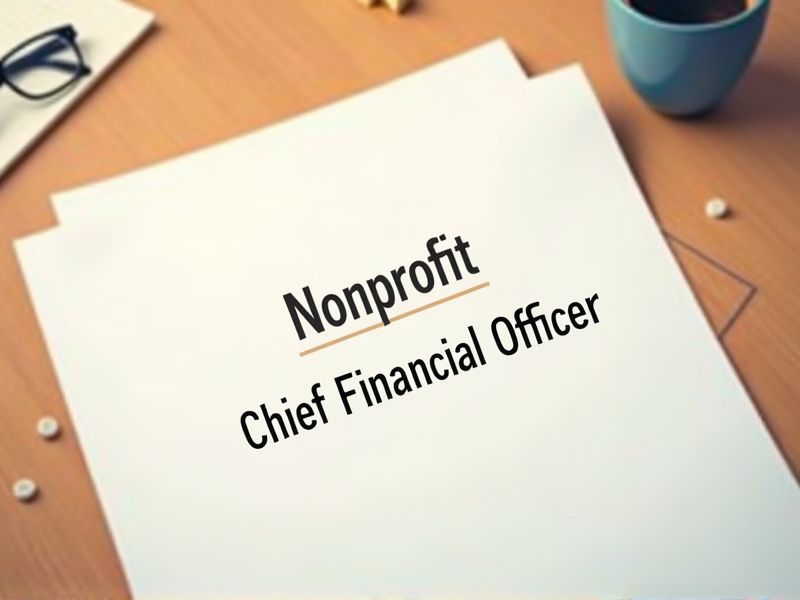
Nonprofit Chief Financial Officers face complex financial challenges that differ significantly from the corporate sector, necessitating specialized skills in managing donor funds and grants. Certifications such as Certified Public Accountant (CPA) or Chartered Financial Analyst (CFA) demonstrate expertise in financial management and compliance, crucial in addressing the varied regulatory environment nonprofits encounter. Financial transparency and accountability are pivotal in maintaining donor trust and organizational legitimacy, which certifications help ensure. Important certifications for a Nonprofit Chief Financial Officer may include the CPA, CFA, and Certified Nonprofit Accounting Professional (CNAP).
Certified Public Accountant (CPA)
A Certified Public Accountant (CPA) ensures compliance with regulatory requirements, which can help the nonprofit maintain transparency and integrity. Their expertise in financial reporting aids in accurate portrayal of the organization's financial status, fostering trust among donors and stakeholders. CPAs bring advanced skills in financial analysis and strategic planning, facilitating informed decision-making to enhance the nonprofit's financial health. Their presence can mitigate risks by establishing robust internal controls and auditing procedures, protecting the organization from financial mismanagement.
Certified Management Accountant (CMA)
Certified Management Accountant (CMA) credential equips a Nonprofit Chief Financial Officer with advanced financial management and strategic planning skills that are crucial in optimizing limited resources. Nonprofit organizations often require transparency and accountability in their financial reporting, which a CMA ensures through rigorous financial analysis and ethical standards. The CMA credential provides CFOs with expertise in budgeting and variance analysis, aiding in maintaining financial stability and achieving operational goals. Moreover, a CMA-certified CFO can effectively align financial strategies with the nonprofit's mission, enhancing overall impact.
Chartered Global Management Accountant (CGMA)
Organizations in the nonprofit sector often face complex financial challenges, and a Chartered Global Management Accountant (CGMA) provides expertise in strategic financial planning and accountability critical to navigating these complexities. A CGMA's skills in cost management and decision analysis help maximize resource allocation, ensuring the nonprofit's financial sustainability. Nonprofit CFOs with CGMA credentials enhance stakeholder confidence through transparent financial reporting and performance metrics. Evolving regulatory and funding environments require these CFOs to adapt quickly, a task for which the strategic acumen of a CGMA is particularly suited.
Certified Internal Auditor (CIA)
The CIA certification equips a Nonprofit CFO with the skills to enhance internal controls, mitigating the risk of financial mismanagement. Nonprofits often face resource constraints, and a CIA-certified CFO is adept at efficient resource allocation while ensuring compliance with relevant laws. This credential helps in fostering stakeholder trust, as donors and grant providers gain confidence in the financial transparency of the organization. The insights from a certified internal auditor can lead to improved strategic financial planning, benefiting the nonprofit's overall mission.
Certified Fraud Examiner (CFE)
Nonprofit organizations face unique financial challenges, making them susceptible to fraudulent activities. A Certified Fraud Examiner (CFE) provides the expertise to identify and address potential fraud risks. The presence of a CFE enhances the trust of donors and stakeholders in the financial integrity of the organization. For a Chief Financial Officer, possessing CFE credentials ensures adherence to ethical standards and strengthens financial oversight.
Certified Government Financial Manager (CGFM)
A nonprofit Chief Financial Officer with a CGFM certification gains a detailed understanding of government financial management, which is crucial when dealing with government grants and compliance requirements. The certification enhances strategic planning abilities, enabling better alignment of financial strategies with the nonprofit's mission and community goals. Fraud prevention and financial transparency improve due to the ethical and technical standards associated with the CGFM. Decision-makers trust that a CFO with such credentials can effectively communicate financial conditions to stakeholders and donors, fostering confidence and sustainability.
Chartered Financial Analyst (CFA)
A Chartered Financial Analyst (CFA) designation equips a Nonprofit Chief Financial Officer with advanced investment management skills, crucial for managing endowments and funding reserves. It signals a high standard of ethics, instilling greater trust among donors and board members. Data-driven financial analysis from the CFA curriculum enhances decision-making efficiency, aligning financial strategies with organizational goals. In a competitive financial landscape, CFAs bring a rigorous, standardized skill set critical for strategic growth and sustainability.
Nonprofit Management Certificate
Nonprofit Chief Financial Officers benefit from a Nonprofit Management Certificate because understanding nonprofit-specific financial regulations ensures compliance and reduces risk of legal issues. This certification provides knowledge of strategic financial planning, which can enhance decision-making and resource allocation. Training in nonprofit management often includes essential skills in fundraising and donor relations, crucial for maintaining organizational revenue streams. The certificate also signals credibility and commitment, potentially improving stakeholder trust and organizational reputation.
Financial Modeling & Valuation Analyst (FMVA)
Nonprofit Chief Financial Officers benefit from Financial Modeling & Valuation Analyst (FMVA) expertise as it enhances their financial forecasting, critical for securing long-term funding. Improved financial analysis through FMVA aids in more transparent reporting, which strengthens donor trust and accountability. Resource allocation in nonprofits becomes more strategic and efficient when guided by FMVA-driven insights, optimizing impact. The FMVA skill set allows nonprofits to strategically plan for growth and sustainability, addressing specific mission-related financial challenges.
Certificate in Nonprofit Financial Leadership
Possessing a Certificate in Nonprofit Financial Leadership equips a Nonprofit Chief Financial Officer (CFO) with specialized skills tailored to the unique challenges of financial management within nonprofit organizations. The certification provides knowledge on compliance with regulatory requirements specific to the nonprofit sector, helping to ensure legal and ethical financial practices. It enhances strategic decision-making capabilities by offering frameworks for effective resource allocation and financial sustainability in mission-driven contexts. The certificate fosters credibility and trust, which can boost stakeholder confidence and support in the organization's financial stewardship.
Summary
When you, as a Nonprofit Chief Financial Officer, obtain certifications, you enhance your credibility and expertise in financial management. Certification often leads to increased trust from stakeholders, showcasing your commitment to best financial practices. You can also expect improved decision-making abilities due to advanced knowledge and skills gained through certification programs. As a result, your nonprofit's financial health and sustainability may significantly benefit.
